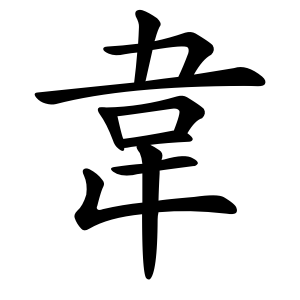韋
- leather, tanned leather;
Etymology
It is a compound ideogram formed by combining 舛 (which means “misaligned feet” or “to be out of step”) and 囗 (which means “enclosure” or “surrounding”).
The character shows the shape of 舛 positioned above and below around 囗, resembling people encircling and moving around a certain center.
Like 革 (which means “leather” or “to skin”), it also carries the meaning of “skinning.” However, while 革 refers simply to the act of skinning raw leather, 韋 specifically refers to the process of tanning the leather.
Usage in Korean
When used as a radical, it conveys meanings related to circling around or leather-related items. As a radical, it is typically placed on the left side (변/邊) of a character.
However, due to the high familiarity of the character 韓 (Han), where 韋 appears on the right side (방/旁), many mistakenly believe that 韋 usually appears on the right.
In characters like 圍 (to surround), 衛 (to guard), and 違 (to go against), the component 韋 plays a dual role, contributing both meaning and sound.
Characters with 韋
- 木一口手 (DMRQ)
- ⿳ 𫝀 口 㐄
